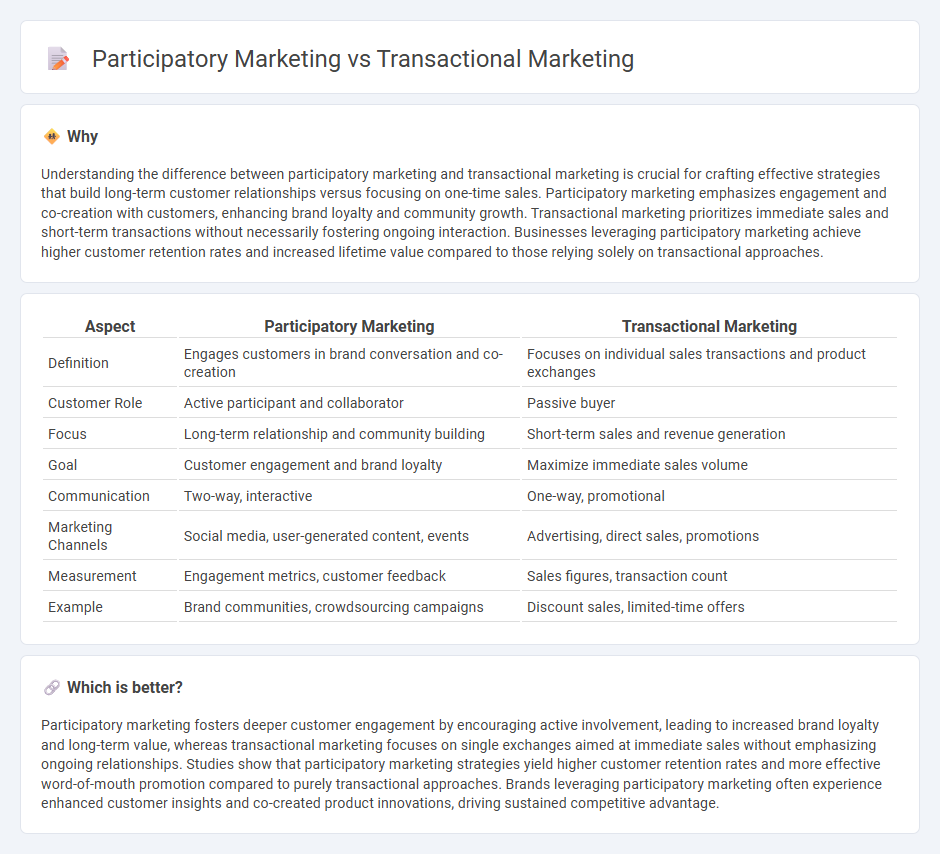
Participatory marketing engages customers by fostering collaboration, interaction, and shared experiences, enhancing brand loyalty through emotional connections. Transactional marketing focuses on single sales events aimed at immediate purchase, prioritizing product features and price over customer relationships. Discover how these marketing strategies shape consumer behavior and influence business growth.
Why it is important
Understanding the difference between participatory marketing and transactional marketing is crucial for crafting effective strategies that build long-term customer relationships versus focusing on one-time sales. Participatory marketing emphasizes engagement and co-creation with customers, enhancing brand loyalty and community growth. Transactional marketing prioritizes immediate sales and short-term transactions without necessarily fostering ongoing interaction. Businesses leveraging participatory marketing achieve higher customer retention rates and increased lifetime value compared to those relying solely on transactional approaches.
Comparison Table
| Aspect | Participatory Marketing | Transactional Marketing |
|---|---|---|
| Definition | Engages customers in brand conversation and co-creation | Focuses on individual sales transactions and product exchanges |
| Customer Role | Active participant and collaborator | Passive buyer |
| Focus | Long-term relationship and community building | Short-term sales and revenue generation |
| Goal | Customer engagement and brand loyalty | Maximize immediate sales volume |
| Communication | Two-way, interactive | One-way, promotional |
| Marketing Channels | Social media, user-generated content, events | Advertising, direct sales, promotions |
| Measurement | Engagement metrics, customer feedback | Sales figures, transaction count |
| Example | Brand communities, crowdsourcing campaigns | Discount sales, limited-time offers |
Which is better?
Participatory marketing fosters deeper customer engagement by encouraging active involvement, leading to increased brand loyalty and long-term value, whereas transactional marketing focuses on single exchanges aimed at immediate sales without emphasizing ongoing relationships. Studies show that participatory marketing strategies yield higher customer retention rates and more effective word-of-mouth promotion compared to purely transactional approaches. Brands leveraging participatory marketing often experience enhanced customer insights and co-created product innovations, driving sustained competitive advantage.
Connection
Participatory marketing and transactional marketing are connected through their shared goal of driving sales, where transactional marketing focuses on single, point-of-sale exchanges and participatory marketing enhances customer engagement to build long-term loyalty. Participatory marketing leverages customer interaction and feedback to create personalized experiences, which can increase the effectiveness of transactional marketing efforts by fostering trust and repeat purchases. Integrating these approaches allows businesses to optimize both immediate sales performance and sustained consumer relationships.
Key Terms
Transactional Marketing:
Transactional marketing emphasizes single sales and quick exchanges by prioritizing product promotion and price incentives to boost immediate revenue. Its approach centers on attracting customers for one-time purchases rather than building long-term relationships, often relying on high-volume sales tactics and aggressive advertising. Discover more about how transactional marketing strategies can impact your business growth and sales funnel.
Sales focus
Transactional marketing emphasizes direct sales by targeting immediate purchases and maximizing short-term revenue through promotional campaigns and product pushes. Participatory marketing engages consumers in brand experiences and co-creation, fostering loyalty and long-term customer relationships that indirectly boost sales over time. Explore deeper insights and strategies to optimize your sales approach through effective marketing models.
Short-term relationships
Transactional marketing emphasizes short-term relationships by prioritizing individual sales and immediate customer transactions, often relying on promotional tactics to drive quick purchases. Participatory marketing, although typically focused on long-term engagement, can incorporate short-term tactics by involving customers directly in campaigns to boost immediate interaction and sales. Discover more about how both strategies impact customer loyalty and business growth.
Source and External Links
Transactional Marketing: The Key to Immediate Sales Growth - Transactional marketing drives one-time purchases by focusing on immediate sales through strategies like product bundling, bulk discounts, and cross-selling or upselling at the point of sale.
What Is Transactional Marketing? - Examples & Strategies - This approach emphasizes closing individual sales rather than building long-term customer relationships, using tactics such as cold-calling, TV shopping channels, upselling, cross-selling, bundling, and point-of-sale promotions.
What is transactional marketing? | Definition from TechTarget - Transactional marketing is a business strategy centered on maximizing the efficiency and volume of individual sales transactions, prioritizing quick conversions over ongoing customer engagement.
 dowidth.com
dowidth.com